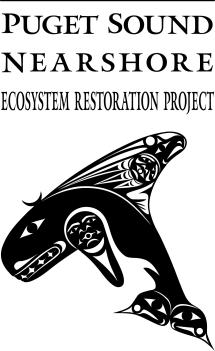
The Puget Sound Nearshore Ecosystem Restoration Project (PSNERP) is an initiative led by the Washington Department of Fish and Wildlife (WDFW) in partnership with the U.S. Army Corps of Engineers (Corps). A significant outcome of this effort was to designate Puget Sound as eligible for federal Corps aquatic ecosystem restoration funding, similar to other waterbodies around the country such as the Everglades, Chesapeake Bay, and the Great Lakes.
The Corps’ General Investigation (GI) study process collected data about Puget Sound and included findings in a series of technical reports and geo-spatial data that culminated in a Final Feasibility Report (PDF) in 2016. The report included recommendations to Congress on opportunities for nearshore restoration.
Bringing together experts from federal, tribal, state, and local governments, universities, and non-profit organizations, PSNERP sought to describe the challenges, opportunities, and federal interests in the Puget Sound nearshore ecosystem. Each step in the Corps’ GI process resulted in a technical product available for use by restoration practitioners in Puget Sound and beyond. WDFW and partners continue to use PSNERP’s foundational science to help guide decision making for nearshore restoration opportunities.
Restoration projects
WDFW staff work with local communities to implement restoration actions identified by PSNERP. Congressional authorization of PSNERP in the Water Infrastructure Improvements for the Nation Act means PSNERP-identified projects are eligible for federal restoration funding using a variety of Corps funding pathways. Current efforts are focused on restoration of the Duckabush estuary in Hood Canal and Spencer Island in the Snohomish River delta. Design and construction costs for these project are shared between the Corps and non-federal project partners, including WDFW.
PSNERP identified 36 project locations throughout Puget Sound as good places to restore natural processes that create and maintain Puget Sound’s unique and valuable nearshore habitat. The Conceptual Design Report (PDF) presents design concepts, including cost and benefit metrics, for these projects and provides a starting place for conversations within a community to shape the concept into a viable project. Since this list of projects was developed in 2016, several of the smaller-scale projects have been completed or are moving towards completion. Larger-scale projects often take more time, funding, and coordination to become ready to advance beyond a conceptual design.
Additional information
- Final Feasibility Report (PDF)
This report documents the planning process for ecosystem restoration of the Puget Sound nearshore zone to demonstrate consistency with U. S. Army Corps of Engineers planning policy and to meet National Environmental Policy Act requirements - Technical Reports
PSNERP technical reports are peer reviewed publications developed between 2001 and 2012 by the partner organizations of the Puget Sound Nearshore Ecosystem Restoration Project for use by others to support restoration in Puget Sound and beyond. - Geo-Spatial Data
Web accessible mapping resources of the Puget Sound nearshore. - Conceptual Design Report (PDF)
Engineering design concepts for a suite of 36 potential nearshore restoration actions identified collaboratively by PSNERP and the larger Puget Sound restoration community of lead entities, tribes, conservation groups, local governments, and others. - Duckabush Estuary Restoration
WDFW, in partnership with the U.S. Army Corps of Engineers and the Hood Canal Salmon Enhancement Group, is proposing a restoration project on the Duckabush River estuary in Jefferson County. The project would occur primarily on public land at the Duckabush Wildlife Area Unit managed by WDFW. - Spencer Island Estuary Restoration
WDFW, in partnership with the U.S. Army Corps of Engineers and Snohomish County, is proposing an estuary restoration project to recreate rare tidal freshwater marsh at Spencer Island, which is co-owned and co-managed with Snohomish County.
For more information, please contact PSNERP Program Manager Theresa Mitchell at Theresa.Mitchell@wdfw.wa.gov